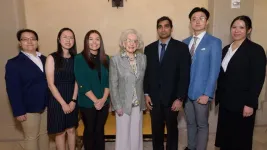(Press-News.org) New study shows grasses are taking an evolutionary shortcut by continually borrowing genes from their neighbours to grow bigger, stronger and taller
The research, led by the University of Sheffield, is the first to show how frequently grasses exchange genes in the wild
The naturally occurring process observed in grasses, including in some of the crops we eat, may mirror methods used to make genetically modified crops
Understanding the rate is important to know the potential impact it can have on a plant’s evolution and how it can drive adaption to the environment
Grass may transfer genes from their neighbours in the same way genetically modified crops are made, a new study has revealed.
Research, led by the University of Sheffield, is the first to show the frequency at which grasses incorporate DNA from other species into their genomes through a process known as lateral gene transfer.
The stolen genetic secrets give them an evolutionary advantage by allowing them to grow faster, bigger or stronger and adapt to new environments quicker.
Understanding the rate is important to know the potential impact it can have on a plant’s evolution and how it adapts to the environment.
Grasses are the most ecologically and economically important group of plants, covering 30% of the earth's terrestrial surface and producing a majority of our food.
The Sheffield team sequenced multiple genomes of a species of tropical grass and determined at different time points in its evolution how many genes were acquired - giving a rate of accumulation.
It is now thought these transfers are likely to occur in the same way that some genetically modified crops are made.
These findings, published in the journal New Phytologist could inform future work to harness the process to improve crop productivity and make more resilient crops, and have implications on how we view and use controversial GM crops.
Dr. Luke Dunning, Research Fellow from the University of Sheffield’s School of Biosciences, and senior author of the research, said: “There are many methods to make GM crops, some which require substantial human intervention and some that don’t. Some of these methods that require minimal human intervention could occur naturally and facilitate the transfers we have observed in wild grasses.
“These methods work by contaminating the reproductive process with DNA from a third individual. Our current working hypothesis, and something we plan to test in the near future, is that these same methods are responsible for the gene transfers we document in wild grasses.
“This means, in the near future, controversial genetic modification could be perceived as more of a natural process.
“Currently, these ‘natural’ reproductive contamination methods are not as efficient in producing GM plants as those that are used routinely, but by further understanding how lateral gene transfer occurs in the wild we may be able to increase the success of this process.”
Since Darwin, much of our understanding of evolution has been based on the assumption that genetic information is passed from parents to offspring - the rule of common descent for plant and animal evolution.
The team's next steps will be to verify their hypothesis by recreating known examples of lateral gene transfer, to investigate whether this ongoing process contributes to the differences we observe between crop varieties.
END
Natural GM crops: grasses take evolutionary shortcut by borrowing genes from their neighbours
2023-10-06
ELSE PRESS RELEASES FROM THIS DATE:
Cambridge University receives $72 million gift for habitat restoration projects across Europe’s land and seas
2023-10-06
Arcadia has made a major new philanthropic donation to the University of Cambridge, taking its total support for the Endangered Landscapes & Seascapes Programme to over $138 million.
The Endangered Landscapes & Seascapes Programme supports the large-scale restoration of Europe’s most treasured but endangered ecosystems, enriching biodiversity while revitalising local economies.
The work recognises humanity’s dependence on healthy, functioning ecosystems - for example in preventing urban flooding, and reducing the impacts ...
New UC Davis study looks at attitudes towards political violence
2023-10-06
(SACRAMENTO, Calif.) — A small segment of the U.S. population considers violence, including lethal violence, to be usually or always justified to advance political objectives. This is according to newly published research from the UC Davis Violence Prevention Research Program (VPRP).
The study provides a complex portrait of the attitudes and concerns about the state of democracy in the U.S. It also highlights the underlying beliefs that may inform the potential for violence.
The study was published Sept. 29, 2023, in Injury Epidemiology. A preprint, or version that had not yet been peer reviewed, was shared online ...
Mays Cancer Center: Targeting certain molecular interactions could yield new strategies for treating prostate cancer
2023-10-06
SAN ANTONIO, Oct. 6, 2023 – Research led by Mays Cancer Center at The University of Texas Health Science Center at San Antonio (UT Health San Antonio) has discovered that altering certain molecular interactions could yield new strategies for treating prostate cancer and related diseases.
The study focuses on androgen receptors (AR), which are protein molecules that help direct the development of male sexual characteristics, essentially by turning genes on or off as necessary.
The researchers determined that an optimum level of ...
Low muscle mass is associated with a two-fold risk of death from heart disease in people with diabetes
2023-10-06
New research being presented at the Annual Meeting of the European Association for the Study of Diabetes (EASD) in Hamburg, Germany (2-6 Oct) shows that low muscle mass is associated with a two-fold risk of death from cardiovascular disease in individuals with diabetes.
This association is independent of frailty, glycaemic control and the microvascular complications retinopathy (damage to the blood vessels of the retina) and nephropathy (kidney disease), the analysis of data on US adults found.
Sarcopenia – age-related loss of muscle mass and strength – was known to be associated with cardiovascular disease (CVD) and mortality ...
Evidence on increased rates of diabetes unclear in trans people, but evidence on higher rates of cardiovascular disease clear
2023-10-06
The latest data on the metabolic problems faced by trans people are presented at a session at this year’s Annual Meeting of the European Association for the Study of Diabetes (Hamburg 2-6 October). While evidence on increased or decreased rates of diabetes among trans men and women remains unclear, the evidence that they face higher rates of cardiovascular disease continues to mount. The talk is by Dr Dorte Glintborg, Department of Endocrinology, Odense University Hospital, Denmark.
“While increased rates of cardiovascular disease might normally go hand-in-hand with increased rates of diabetes, for trans men (assigned female at birth AFAB), use of testosterone ...
New study at the Alzheimer’s Center at Temple casts light on protein that could help defeat Alzheimer’s disease and increase productive lifespan
2023-10-05
Alzheimer’s disease is the most common type of dementia, a disorder of progressively worsening memory and other thinking abilities. It rose up in the ranks of leading causes of death over the past several decades. It can also limit the duration of a working career, create uncertainty in the financial planning for retirement and rob patients of enjoyment and happiness in the final years. An effective treatment against this disease could give back to the patient the decision when to retire and improve quality of life in advanced age.
Now, scientists at the Alzheimer’s Center at Temple at the Lewis Katz School of Medicine at Temple University are on the trail ...
Up-and-coming researchers vie in a 'Shark Tank'-inspired competition during the Ramona Jones Friends of BrainHealth Scientist Selection Luncheon
2023-10-05
On October 2, 2023, Center for BrainHealth, part of The University of Texas at Dallas, held its annual Friends of BrainHealth Scientist Selection Luncheon at the Dallas Country Club. This year was a special one, with Ramona Jones, founding BrainHealth Advisory Board member, kicking off a five-year sponsorship of the luncheon. Her five children made this sponsorship gift in her honor and surprised her with the naming for her 95th birthday in August 2023.
The Friends of BrainHealth donor circle is dedicated to supporting ...
Who will have ‘miracle’ improvement of rheumatoid arthritis during pregnancy?
2023-10-05
Rheumatoid arthritis appears three times more often in women
Women need to know whether they can stop taking drugs while pregnant
Genetic markers could predict who will improve and who will worsen during pregnancy
When women with rheumatoid arthritis (RA) plan to become pregnant, many anguish over whether to stop their medications, risking a flareup in their disease, or continue with medication and risk possible harm to the baby.
About 50% to 75% will see their disease naturally improve during pregnancy for not-yet-known reasons, while others may see a worsening of their RA. But they have had no way of knowing which would happen to them.
Now, Northwestern Medicine scientists ...
Groundbreaking study shows defects spreading through diamond faster than the speed of sound
2023-10-05
Settling a half century of debate, researchers have discovered that tiny linear defects can propagate through a material faster than sound waves do.
These linear defects, or dislocations, are what give metals their strength and workability, but they can also make materials fail catastrophically – which is what happens every time you pop the pull tab on a can of soda.
The fact that they can travel so fast gives scientists a new appreciation of the unusual types of damage they might do to a broad range of materials in extreme conditions – from rock ripped apart ...
AI-driven earthquake forecasting shows promise in trials
2023-10-05
A new attempt to predict earthquakes with the aid of artificial intelligence has raised hopes that the technology could one day be used to limit earthquakes’ impact on lives and economies. Developed by researchers at The University of Texas at Austin, the AI algorithm correctly predicted 70% of earthquakes a week before they happened during a seven-month trial in China.
The AI was trained to detect statistical bumps in real-time seismic data that researchers had paired with previous earthquakes. The outcome was a weekly forecast in which the AI successfully predicted 14 earthquakes within about 200 miles of where it estimated they would happen and at almost exactly the ...



